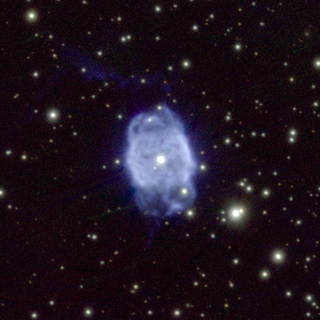NGC 40
Planetary Nebula in the constellation of Cepheus From Wikipedia, the free encyclopedia
NGC 40 (also known as the Bow-Tie Nebula and Caldwell 2) is a planetary nebula discovered by William Herschel on November 25, 1788, and is composed of hot gas around a dying star. The star has ejected its outer layer which has left behind a small, hot star.[4] Radiation from the star causes the shed outer layer to heat to about 10,000 degrees Celsius and become visible as a planetary nebula. The nebula is about one light-year across.[4] About 30,000 years from now, scientists theorize that NGC 40 will fade away, leaving only a white dwarf star approximately the size of Earth.[4]
| Emission nebula | |
|---|---|
| Planetary nebula | |
 PanSTARRS false-color image of NGC 40, using the red r-band image as blue | |
| Observation data: J2000 epoch | |
| Right ascension | 00h 13m 01.017s[1] |
| Declination | +72° 31′ 19.03″[1] |
| Distance | 1,619[2] pc |
| Apparent magnitude (V) | 11.6[3] |
| Apparent dimensions (V) | 38″ × 35″[3] |
| Constellation | Cepheus |
| Designations | Bow-Tie Nebula, Caldwell 2, PN G120.0+09.8 |
Morphologically, the shape of NGC 40 resembles a barrel with the long axis pointing towards the north-northeast. There are two additional pairs of lobes around the poles, which correspond to additional ejections from the star.[5]
The central star of NGC 40 has a Henry Draper Catalogue designation of HD 826.[6] It has a spectral type of [WC8], indicating a spectrum similar to that of a carbon-rich Wolf–Rayet star.[7] The central star has a bolometric luminosity of about 7,000 L☉ and radius of 0.56 R☉. The star appears to have an effective temperature of about 71,000 K, but the temperature of the source ionizing the nebula is only about 45,000 K. One proposed explanation to this contradiction is that the star was previously cooler, but has experienced a late thermal pulse which re-ignited fusion and caused its temperature to increase.[6]
Gallery
- Image of NGC 40 by Amateur Astronomer
- Optical image from the WIYN telescope
References
External links
Wikiwand - on
Seamless Wikipedia browsing. On steroids.



